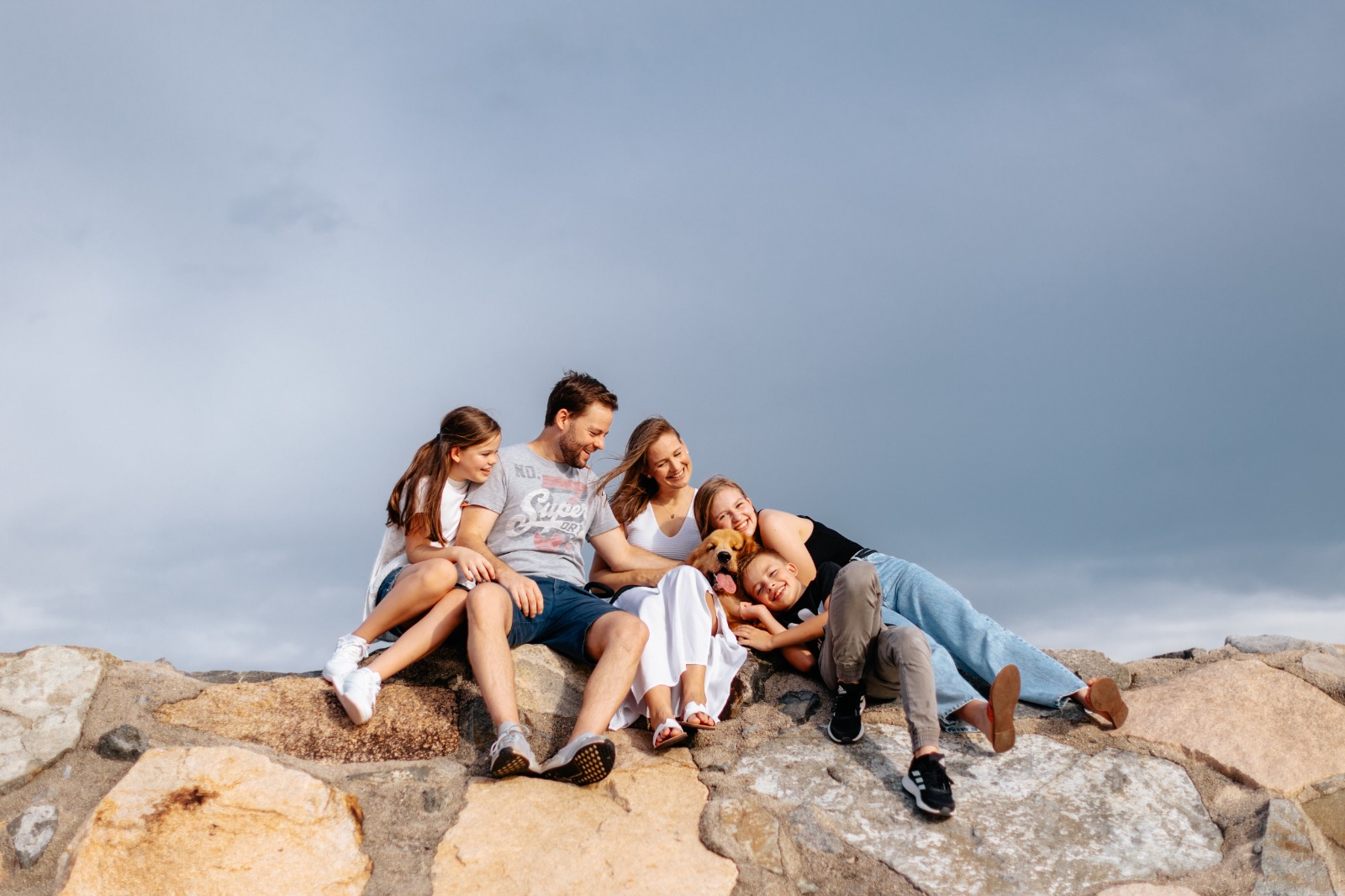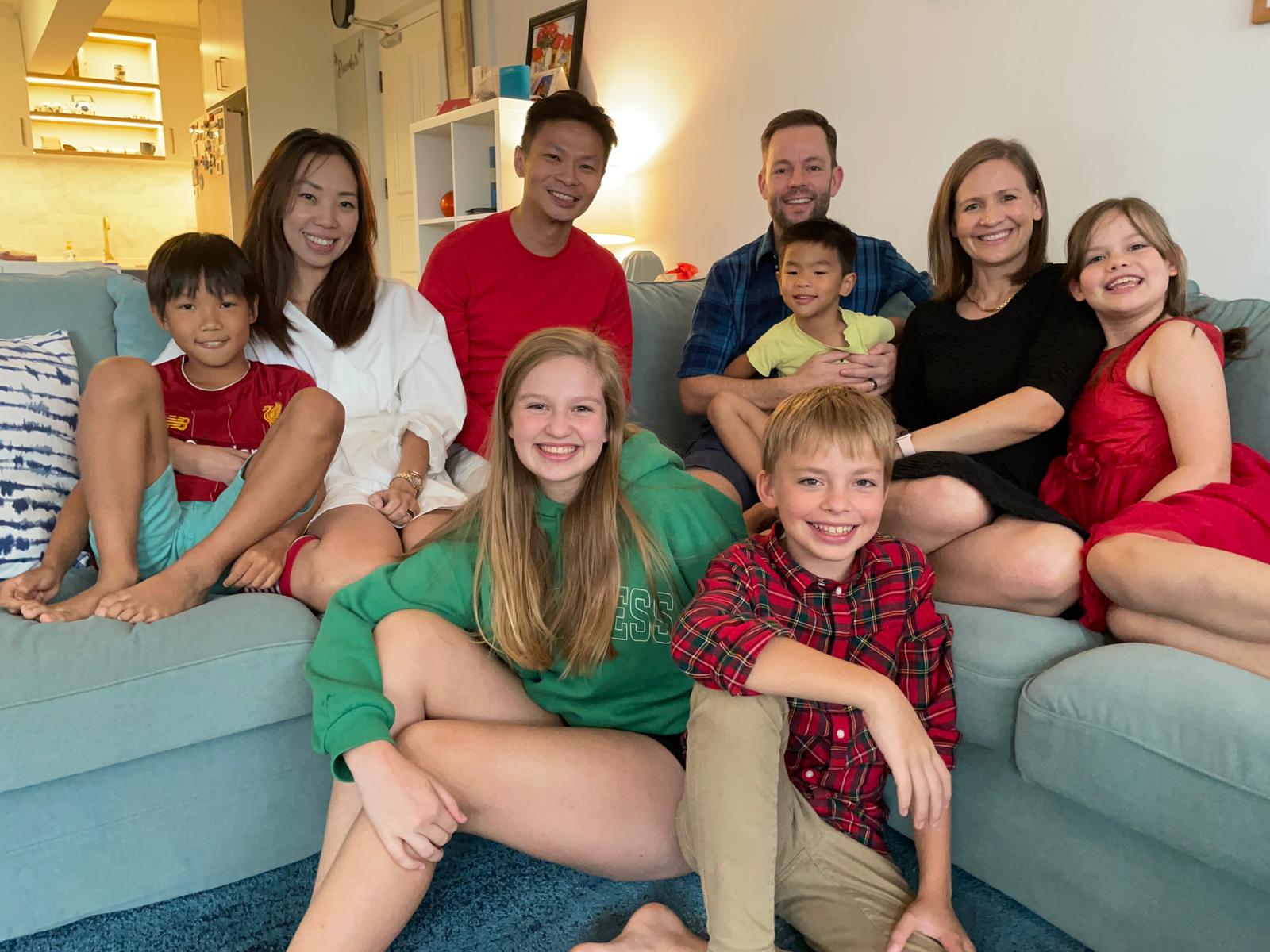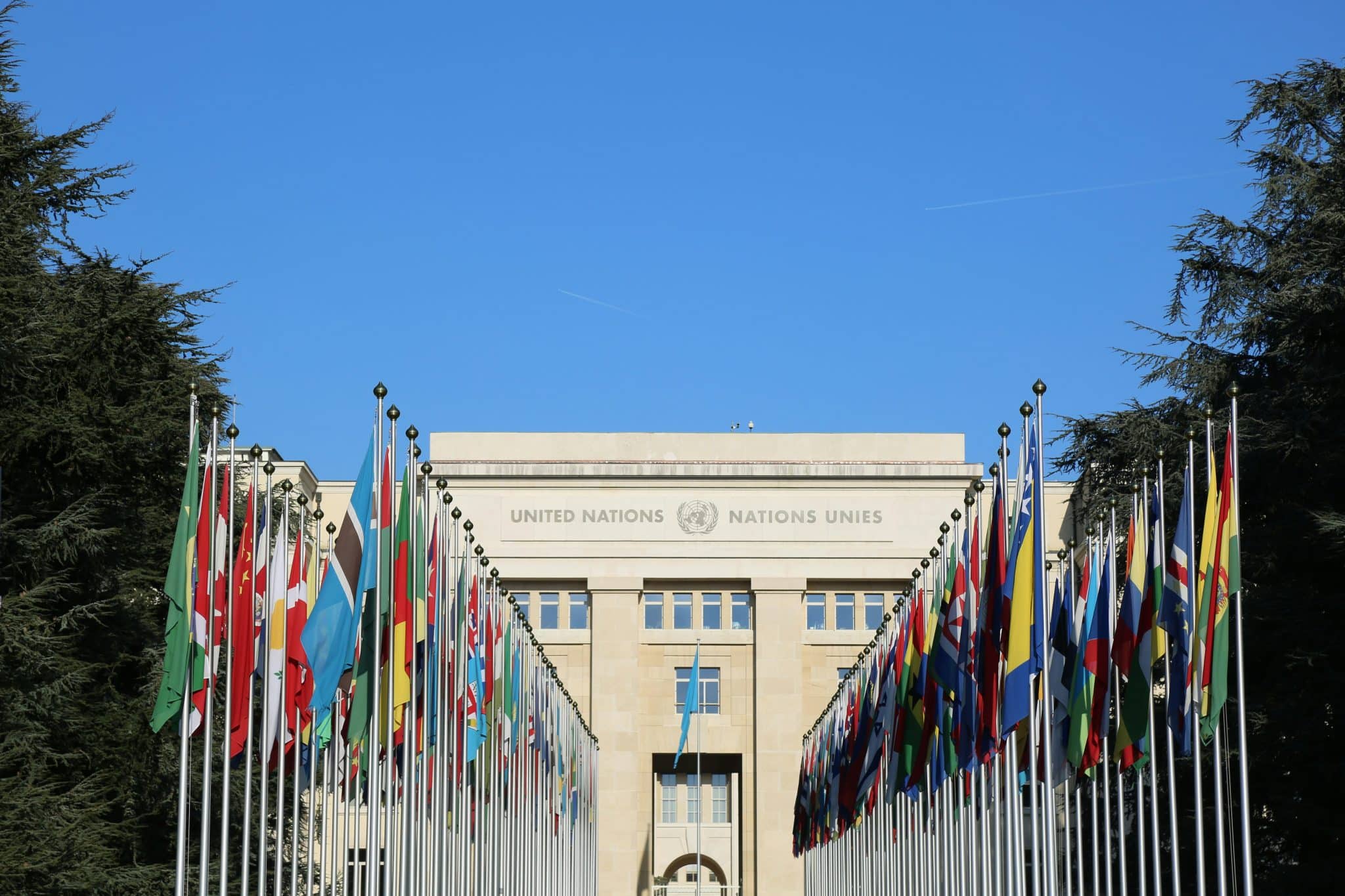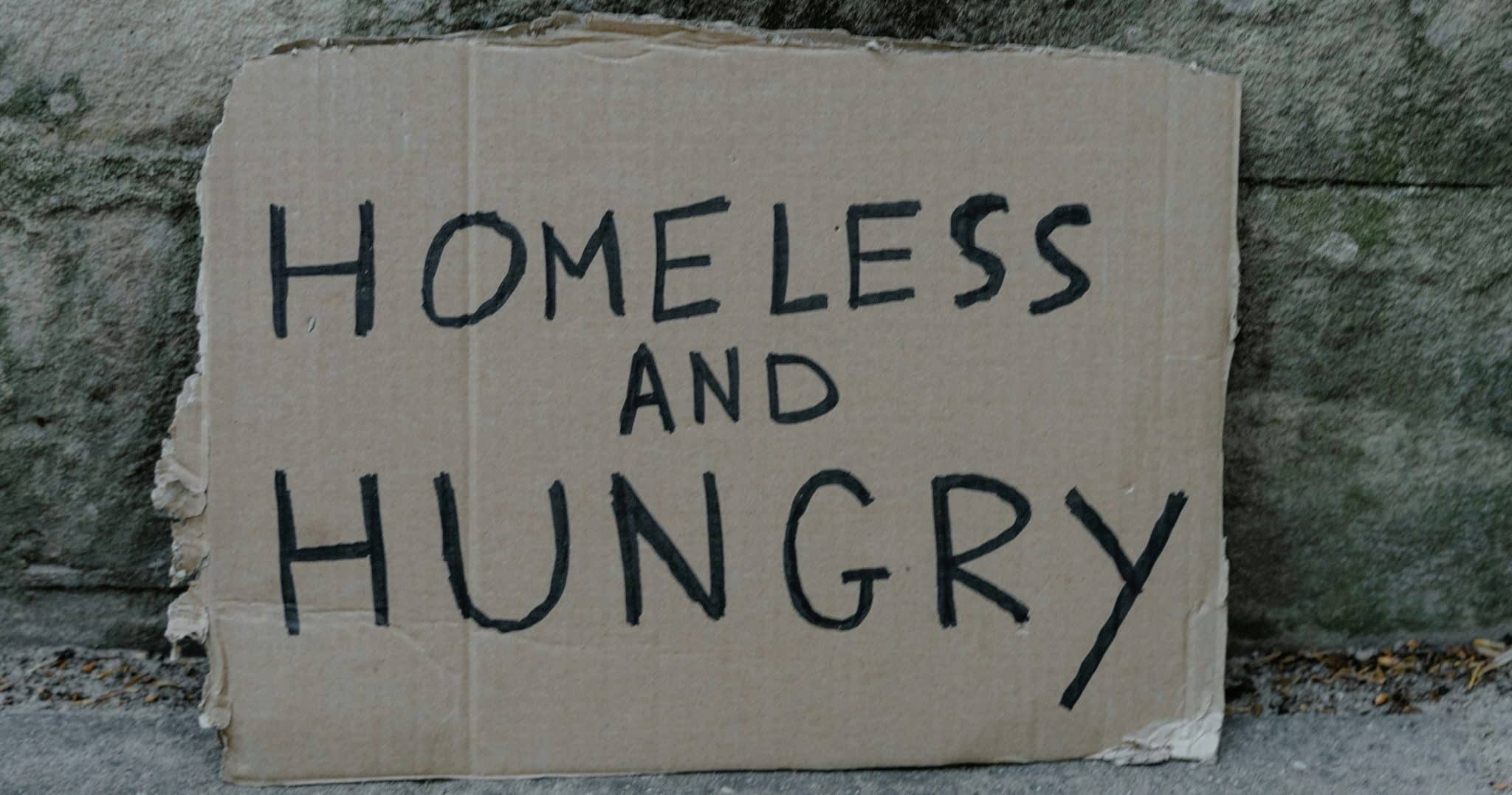“God put us here and we are committed to loving and serving its people”: Pastor who gave up multiple passports to become a Singapore citizen
In celebration of Singapore's 56th National Day, Salt&Light brings you a series on what Home means to our people, both citizens and those passing through.
Ethel Lim // August 6, 2021, 1:09 pm

“No country is perfect, but we are very privileged to be here. We love it, and feel like God has just blessed us immensely through this place,” shares Pastor Simon Murphy, with his family at East Coast Park. The Murphy family chose to become Singapore citizens in 2020. All photos courtesy of Simon Murphy.
Ask Pastor Simon Murphy, lead pastor of Redemption Hill Church, about life in Singapore, and he animatedly chats about his HDB home and his love for durians, adding with a chuckle: “Am I allowed to say that bak kut teh is what makes Singapore feel like home?”
“It’s very hard to crystallise Singapore, but it’s the people, the buzz, walking around and enjoying the scents from the hawker centers – it just feels like home,” the South African turned Singapore citizen tells Salt&Light.
After leaving Johannesburg on September 3, 2008, with his wife, Tarryn, and their (then) two children in tow, the Murphys came to Singapore after being led by God to plant a church here.
The three Murphy children, the youngest of whom was born in Singapore, are now 10, 13 and 15. The entire family became Singapore citizens in January 2020.
“We didn’t want to move to Singapore because it ‘seemed’ right, or circumstantially things lined up. We wanted to know deep in our hearts that God had spoken to us,” Simon adds in his blog.
“It took about three months for both Tarryn and I to have both individually heard from God that this was His plan for us.
“For me, it happened at about 7am one morning when I was up praying in the nation of Sierra Leone, overlooking the sea. In that one moment, I had the conviction to move forward knowing that He was with us and would pave the way ahead.”
Will we be received?
“The fears that we initially had pertained both to the church plant, and more broadly, moving to a different culture,” Ps Simon tells Salt&Light. “I think one of the biggest questions and fears that we had was whether we would be received by people, whether they would really accept us and take us in.
“But we have really found Singaporeans to be very, very warm and wonderful people. I think that, honestly, has been one of the biggest joys.
“There was a couple who actually visited RHC on the first Sunday that we ever had a service. We met them for the first time on that day, and very quickly they became friends with us.

The Murphys celebrating Christmas with the Wongs. “When we travel, or if we go away, the thing that we miss most about Singapore are the people,” shares Pastor Simon.
“They would take us out for meals, explain the different food in Singapore and how things work. They invited us over to their home, and they just put so much courage and confidence into us. They really sought to love and support us, given that we had only been in Singapore for a few months.
“We had no personal history at all with them, so it really did feel like a godsend. They were so immensely generous to us: People from their extended family offered us a place to stay, and that was really a haven for us for two years.
“That mix of generosity with their time and knowledge and experiences helped us to settle down in Singapore so much better, and that was really encouraging for us.”
Shaped by a new culture
“Another thing that we were quite excited about was just learning from a new culture,” says Ps Simon.
“One of the things that we were taught beforehand is that when you move to another country, you should think of your move into another culture as stepping up into it. That’s how you learn, appreciate and grow. I think you end up becoming a better person as a result.
“God used this culture to help me better understand His ways.”
“I have been really challenged by coming here and realising just how individualistic the West actually is, and how we don’t really honour our parents the way we should.”
He added: “I remember first coming here and feeling that Singaporeans were too conscious of their parents’ wishes, and that they should be liberated from such seemingly slavish obedience to their parents.
“But then I had conversations with a couple of Singaporeans who really pushed back on me about that and pointed me to how Scripture commands us to honour our parents (Exodus 20:12). As I realised my own culture’s view of parents was deficient, God used this culture to help me better understand His ways.
“It has really challenged me to think about how I can honour my parents in a healthy way. This is one example of the ways that the culture has shaped and affected me, I think, and it really has been a joy.”
Affirming the kids through the pressures
“I grew up in South Africa during a time of great instability. As a young boy I remember seeing the violence in the country, understanding the fears of the people and being affected by the trauma of terrorism around me. So one of the things we really appreciate about Singapore is the sense of safety here.
“I know it’s easy to see the challenges in Singapore when you’ve lived here all your life, but when you compare it to how things are in other countries, you really have a sense of appreciation for many aspects of life in Singapore, just because you’ve experienced so much dysfunction in other countries.
“That’s not to say that all is rosy and perfect in this little island.
“Every country in the world has parts about it that are wonderful by God’s common grace, and other parts that are challenging.”
“When you come to Singapore from abroad, you hear stories about the pressures of the education system. There are many great things about the education system here, but the truth is, in South Africa our kids wouldn’t have had nearly as much academic pressure.
“But there would have been other pressures, like safety. Our view is that every country in the world has parts about it that are wonderful by God’s common grace, and other parts that are challenging.
“So it’s less a matter of whether or not there are challenges there – because there are challenges everywhere – but a matter of what kind of challenges there are. We had to learn how to navigate the pressured environment that our kids were placed in here.
“The challenge for us has been to try and treat each of our children as individuals, and not just expect them to conform to others’ expectations of them.
“Our goal in parenting is to try and develop their character, so faithfulness, diligence, perseverance, those kinds of things, and trust that putting character in them is going to take them further in life than just their good grades. Whilst at the same time recognising that we are in Singapore, and that grades are not unimportant.
“What we have learnt is that one can really help their children through school pressures by having a supportive home environment, where your kids are being affirmed and loved for who they are. I think that does help immensely.”
Wounds waiting to be healed
In more ways than one, Simon has also been pushed to see the cracks in this country state.
“One of the things that we discovered soon after arriving was how brokenness exists below the surface in Singapore. When you come to Singapore as a visitor you’re going to be seeing the nice areas, and noting how people are very well put together.”
“In spite of all the obvious blessings we enjoy in Singapore, there are many wounds waiting to be healed.”
Simon recalls one particularly crazy day in the first year where he was called to go to two separate houses for domestic disturbances, and found himself needing to walk through shattered glass and broken furniture (in both houses) to engage with families torn apart by strife.
These families had presented themselves as ‘picture perfect’ on Sundays, and yet behind that public display was real hurt and pain.
“Then after, I go to a community group, and the people are talking about their difficulties in their families and marriages etcetera, and at that moment it hits me that these people are struggling so much more than I realised.
“I realised then, that in spite of all the obvious blessings we enjoy in Singapore, there are many wounds waiting to be healed.
“This gave me a great sense of privilege, as someone who is finding healing in Jesus for my own brokenness, to be able to share with others the hope that I have found in Jesus.”
Committed to place and people
The entire Murphy family became Singapore citizens in January 2020.
“Our earthly citizenship is not our ultimate identity.”
“When I think about what it means to be a Singaporean, I think for me it is to love and serve the people of this nation,” says Ps Simon.
“To really be committed to the place and the people. That doesn’t mean you feel great about it all the time, but it means that you are committed to it.
“In some ways, having chosen to become Singaporeans has made it easier for us to love it, because we’ve had the ability to choose it. But the fact that Singapore has also accepted and received us has actually been very moving too.
“After I became a citizen, I felt a deeper commitment to Singapore than I had before, and I was kind of surprised by that because I didn’t really know that I could be more committed to Singapore than I was. But there is something about being accepted by a nation that made that so.
Citizenship on earth and in heaven
“To be Christian makes me both take my citizenship more seriously and less seriously at the same time,” says Ps Simon. “It’s more important in the sense that we believe God has determined the exact time and places that we should live in, so we don’t see where we live as being random or arbitrary.
“God has put us here, and so we want to be committed to serving it. In this way we take it very seriously.
“But in another way, being a Christian helps you take it less seriously too. Because I held both a South African and a British passport, many people were telling me that it was a huge thing to give up.
“Knowing that I am first and foremost a citizen of heaven and a child of God has helped to anchor my sense of real identity.”
“But when you are a Christian, you know that your citizenship is in heaven – and that’s not just a trite saying, but that’s what we really believe.
“Our earthly citizenship is not our ultimate identity. It’s important, and I get to contribute and love and serve this country. But it’s not my ultimate identity and destiny.
“Having that sense of security has helped me to embrace my citizenship, whilst not worrying about what I’m giving up.
“Having had multiple citizenships in my life and having lived in different countries, knowing that I am first and foremost a citizen of heaven and a child of God has helped to anchor my sense of real identity.
“It also gives me a great sense of excitement, to be honest, about Heaven. Revelation 7 describes how people from every tribe, nation, and tongue are going to be there, worshipping God. It’s not going to Caucasian or monocultural.
“In addition, every culture has aspects that display something of God’s Kingdom through common grace. So we will experience the best of all these cultures in a perfectly redeemed way. I’m excited that Heaven will include the best of Singaporean culture!
“One of the wonderful things about the Kingdom of God is that when God calls His people to lay down their lives and make sacrifices to serve Him, they often find that while they are doing that they are far more blessed and enriched themselves through their service.
“We realised that actually God was blessing us and giving us more than we have ever given.”
“You could have felt like you made a huge sacrifice, but then realise that God has actually blessed you with far more than anything that you could have given. So initially, when we came to Singapore, we saw all the sacrifices: Leaving family, comfort, and the beauty of South Africa, and now we’re staying in this small HDB flat.
“But when we looked back, we realised that actually God was blessing us and giving us more than we have ever given. I think that inspires us to continue to live that way, and to love other people, so that we can be a blessing to Singapore.
“Ultimately, it’s the Gospel, and our faith in it, that gives us this ability to love and serve this place, and to see the good in it without being naïve. It gives us a particular kind of love and optimism and appreciation for something, not rooted in unreality, but in the ability to see with God’s eyes: To see the good but not deny the challenges.
“No country is perfect, but we are very privileged to be here. We love it, and feel like God has just blessed us immensely through this place.”
This is the second story in our National Day series leading up to August 9. Read the other stories below.
RELATED STORIES:
A Bicentennial look-back at the extraordinary history of the Singapore Church
We are an independent, non-profit organisation that relies on the generosity of our readers, such as yourself, to continue serving the kingdom. Every dollar donated goes directly back into our editorial coverage.
Would you consider partnering with us in our kingdom work by supporting us financially, either as a one-off donation, or a recurring pledge?
Support Salt&Light




